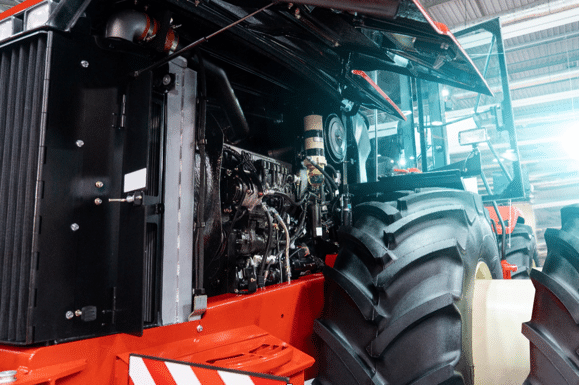Menu
Fix It Yourself: How a New Copyright Exemption Could Change Everything from McFlurries to Tractors
January 29th, 2025

The US Copyright Office has granted an exemption to copyright law that is expected to benefit fans of the McDonalds’ McFlurry.
For years, hopeful McFlurry-eaters have often been told that the ice cream machine is out of order.
As the New York Times explains,
When a McDonald’s ice cream machine breaks down, simple fixes are often stymied by digital locks installed on the machines by the manufacturer, Taylor Company, according to iFixit, an online repair guide that helped petition for the exemption. A provision in the Digital Millennium Copyright Act made it illegal for a third party — like a franchiser or a McDonald’s employee — to bypass a digital lock. IFixit said repairs must be done by a manufacturer-authorized technician.
The Digital Millennium Copyright Act (DMCA), makes it unlawful to circumvent technological measures used to prevent unauthorized access to copyrighted works, including copyrighted books, movies, video games, and computer software – including the software that runs ice cream machines.
17 U.S. Code § 1201 states, "No person shall circumvent a technological measure that effectively controls access to a work protected under this title.”
It’s also illegal to “traffic” in tools that can be used to circumvent such protections.
The new exemption to the DMCA rules allows McDonald’s and other restaurants to repair “retail-level commercial food preparation equipment” without the involvement of the manufacturer.
As WIPO Magazine explains,
The right to repair is the notion that consumers should have the right to repair their lawfully purchased products directly, or by selecting a repair service of their choice, as opposed to returning to the manufacturer or manufacturer-approved providers for the repair. In general, most consumers think they automatically have the right to repair a product they own. Yet, … this is not always the case. On the contrary, in many instances, only manufacturers or manufacturer-approved services can repair the product they sell.
The right to repair often relates to intellectual property (IP) law via the DMCA’s anti-circumvention rules.
Although the DMCA only applies in the United States, many other countries have introduced similar laws.
As WIPO Magazine notes, a consumer movement supporting the right to repair has been growing, inspired by a 2012 Massachusetts law that allows for the right to repair cars. Under this law, car manufacturers must provide manuals and replacement parts to the public so that the car owners can perform their own repairs – often aided by helpful YouTube car repair videos.
Supporters of the right to repair believe that it lowers costs for consumers. They also argue that the right to repair is good for the environment since if it’s cheaper to throw away and replace a broken item rather than fix it, more waste (including toxic electronic waste) will end up in landfills.
For example, notes WIPO Magazine, 350,000 cell phones are discarded every day. (More than four million new phones are estimated to be sold every day.)
Some companies have changed their policies in response to right-to-repair campaigns. For example, in 2022, Apple launched a "self-service repair" scheme allowing customers to replace their own iPhone batteries, screens, and cameras.
On the other hand, many manufacturers oppose the right to repair because of issues of security, safety, and liability.
They argue that unauthorized repairs can cause safety hazards and injuries for which the manufacturers might be liable. They also claim that unauthorized repairs can make communications devices easier to hack.
Even farm equipment has been the subject of a high-profile right-to-repair dispute.
As the BBC reported, Deere and Co. is one of the world's largest makers of farming equipment and makes John Deere tractors. Until recently, farmers were only allowed to use authorized Deere parts and service facilities rather than cheaper independent repair shops.
Deere has also faced lawsuits claiming that it monopolizes repair services.
However, in 2023, the American Farm Bureau Federation (AFBF) and Deere & Co. signed a memorandum of understanding (MOU) to
through a voluntary private sector commitment to outcomes rather than legislative or regulatory measures… continue to enhance the ability of Farmers to timely control the lawful operation and upkeep of Agricultural Equipment…
Under the MOU,
equipment owners and independent technicians will not be allowed to "divulge trade secrets" or "override safety features or emissions controls or to adjust Agricultural Equipment power levels."
As Agriculture Dive reports,
Under the memorandum, the Farm Bureau agreed to refrain from lobbying for right-to-repair legislation in exchange for commitments from Deere to supply farmers and third-party repair shops with the information necessary to repair machinery. States such as California and Minnesota have exempted agriculture in their right-to-repair laws, and Colorado remains the only state to ensure farmers can fix their own tractors following legislation passed last year.
However, the MOU may not succeed in avoiding regulation.
Public Interest Research Group (PIRG) has claimed that the MOU failed to fully address farmers’ issues because repair materials provided to farmers withhold or redact “information required to independently complete many repairs.”
As Agriculture Dive reported in October, The US Federal Trade Commission (FTC) has been investigating Deere since 2021 to determine whether its equipment repair policies violate consumer protection laws.
The FTC is investigating whether Deere violated Section 5 of the Federal Trade Commission Act, which prohibits companies from misleading consumers or engaging in unfair practices that affect commerce.
According to a statement by Nathan Proctor, PIRG’s U.S. senior right-to-repair campaign director,
When farmers can’t access the proprietary software tools that are required to diagnose or complete repairs, that means they have to wait for an authorized technician before they can finish their work. The weather doesn’t wait on a dealership’s schedule — a delay could mean the loss of your harvest.
PIRG, along with 11 farmers’ unions, farm advocacy groups, and right-to-repair advocates, filed an FTC complaint against John Deere in March of 2022, claiming that
Deere is the dominant force in the $68 billion U.S. agricultural equipment market, controlling over 50% of the market for large tractors and combines. For many farmers and ranchers, they effectively have no choice but to purchase their equipment from Deere. Not satisfied with dominating just the market for equipment, Deere has sought to leverage its power in that market to monopolize the market for repairs of that equipment, to the detriment of farmers, ranchers, and independent repair providers.
Categories: Copyright








